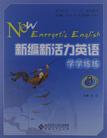新编新活力英语学学练练-3
出版时间:2012-8 出版社:北京师范大学出生集团,安徽大学出版社 作者:赵茹 编 页数:148
内容概要
《高等学校“十一五”规划教材:新编新活力英语·学学练练(3)》符合教育部高教司公布的《高职高专教育英语课程教学基本要求》(试行),即坚持以应用为目的,以实用为主、够用为度。考虑到高职高专学生的实际起点和未来需求,所选材料真实、新鲜,注重反映社会、政治、经济、法律、健康、文化等领域里快速发展变化的时代特征。难度上以够用为度,不过多呈现复杂文章,不涉及纯理论性的讲解和操练。 《高等学校“十一五”规划教材:新编新活力英语·学学练练(3)》符合高职高专学生的认知特点和学习习惯、教材设计上反映学生作为学习主体的地位,各环节的顺序安排体现高职高专学生的认知习惯,以互动形式的热身(warmingup)开始每一个单元,以学生互动的小活动引导每一项新内容的学习,教学设计突出任务型、互动型特点,避免教师进行按部就班、照本宣科式的教学。 《高等学校“十一五”规划教材:新编新活力英语·学学练练(3)》编排形式活泼,使学生乐于学习。本套教材设计了多幅图片,各环节均以生动的语言和活泼的形式予以呈现。各单元的结尾部分为“Having Some Fun”,以轻松、偷快的形式结束每一单元的学习。
书籍目录
UNIT 1 LifeLanguage PointsPassage TranslationScript to Listening ComprehensionSupplementary ExercisesUNIT 2 Shopping OnlineLanguage PointsPassage TranslationScript to Listening ComprehensionSupplementary ExercisesUNIT 3 International TradeLanguage PointsPassage TranslationScript to Listening ComprehensionSupplementary ExercisesUNIT 4 FoodLanguage PointsPassage TranslationScript to Listening ComprehensionSupplementary ExercisesUNIT 5 Social ProblemsLanguage PointsPassage TranslationScript to Listerung ComprehensionSupplementary ExercisesUNIT 6 HealthLanguage PointsPassage TranslationScript to Listening ComprehensionSupplementary ExercisesUNIT 7 FilmLanguage PointsPassage TranslationScript to Listening ComprehensionSupplementary ExercisesUNIT 8 Laws and OrdersLanguage PointsPassage TranslationScript to Listening ComprehensionSupplementary ExercisesKeys to Supplementary Exercises
章节摘录
Language Points Passage A 1. The man running the stand was obviously having a bad day. 【译文】那天,那个摊主显然不太高兴。 【解释】running为现在分词作后置定语,修饰the man。 e.g. The boy reading a book is his little brother. 读书的那个男孩是他弟弟。 The girl standing under the tree is really charming. 站在树下的女孩的确可爱。 2. He was rude, abrupt and unsmiling as we purchased ourpapers,which served to only add more gloom to my day. 【译文】我们买报纸的时候,他不太礼貌,言语生硬,表情严肃,这让我那天感到更加郁闷。 【解释】(1)此句中,which引导非限制性定语从句,修饰前面整个句子。which引导定语从句时,可修饰表示事物的先行词,在定语从句中充当主语、宾语或者表语。 e.g. He was reading a book, which was about art. 他正在读一本关于艺术的书。(关系代词which指代book,在定语从句中充当主语。) He was reading a book, which he had bought fromHong Kong. 他正在读一本书,这本书是从香港买回来的。(关系代词which指代book,在定语从句中充当宾语。) (2) which引导非限制性定语从句时,有一个特殊用法,即它所引导的非限制性定语从句修饰主句中更多的部分甚至整个主句(这时被定语从句所修饰的“先行词”要作广义理解),which仍在定语从句中作主语、宾语或表语。 e.g. He set free the birds happily, which was a celebrationfor his kindness. 他开心地把鸟放了,这是对他善心的一种庆祝。 But her teacher tried to explain the question bydrawing a picture, which helped her to understandthe question immediately. 但是她的老师试图通过画图来解释,这有助于她立刻理解这个问题。 He bought a house without telling his wife, whichlet her become very angry. 他没告诉妻子就买了房子,这让他的妻子非常生气。 3. We then separated to go to our respective workplace. 【译文】此后,我们各自去了自己工作的地方。 【解释】(1) respective:各自的,各个的 e.g. Everyone has his respective merits and defects. 每个人都有各自的长处和短处。 The foreign students went back to their respectivecountries. 外国留学生回到各自的国家去。 (2) respectful:有礼貌的,恭敬的 e.g. You should be respectful to the old. 对长者应该彬彬有礼。 He received her with a respectful attitude. 他恭恭敬敬地接待了她。 ……
编辑推荐
《高等学校“十一五”规划教材:新编新活力英语·学学练练(3)》特点: 权威 由众多高职院校和部分本科院校的资深教授以及一线骨干教师组织编写。 实用 难易适中,选材紧密联系现实生活,编排科学,符合高职高专学生的认知特点和学习习惯。 新潮 开本时尚、大方,版式新颖、活泼、美观、醒目,紧随当下流行的英语类教材风格。
图书封面
评论、评分、阅读与下载
